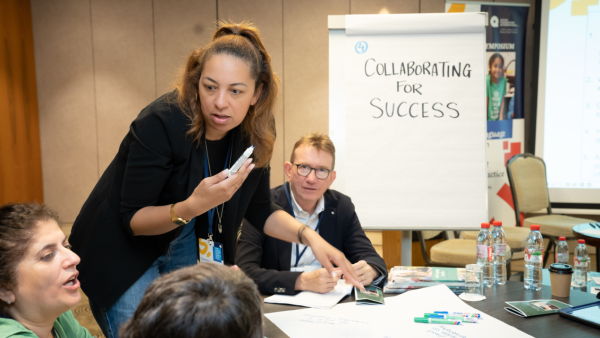QFI Symposium Discusses the Realities of Policy and Practice of Arabic Language Learning in Europe

QFI, a member organization of Qatar Foundation, convened attendees from fourteen different countries across Europe, the UK, US and Australia for the Symposium. From changing perceptions around the Arabic language to building sustainable school programming, engaging communities, and envisioning the future, panelists and attendees explored key questions and themes that shape the teaching and learning of Arabic today and developed actionable plans for future collaboration.
“We need to aim high: Arabic teachers should receive no less support than teachers of any other foreign language,” said panelist Paula Rötscher to a room full of educators, policymakers and academics. Paula’s statement set the tone for ensuing conversations centered around the status of Arabic language education in Europe today – and goals for the future – in the QFI Symposium, titled Arabic Language Learning in Europe: Realities of Policy and Practice.
“In the case of Arabic, we should be ambitious,” added another panelist, Dr. Fabrice Jaumont, president of the Center for the Advancement of Languages, Education, and Communities. "Universities should coordinate with high schools so that students don’t start their language journeys in university. We need to increase awareness of vocational pathways. We need to increase cooperation, establish robust networks, and equip teachers to ensure success.”
For the past fourteen years, QFI has been encouraging the study of Arabic as a global language
by supporting the professionalization of Arabic teaching and research-informed methodology and practices. With extensive experience in Europe and the Americas, QFI supports educators, administrators, students, researchers and other experts across the Arabic language ecosystem to advance the value of teaching and learning Arabic as a global language.
“The symposium was an extraordinary opportunity for reflection. The sessions were thought-provoking, inspiring, highly-engaging, and provided valuable insights into the main challenges of teaching Arabic in the twenty-first century,” said Kurstin Gatt, lecturer in the Department of Middle Eastern and Asian Languages and Cultures at the University of Malta. “A diverse range of expert speakers from across Europe shared their expertise, sparking stimulating discussions among attendees.”
QFI envisions a future where Arabic is a global language offered in classrooms beyond the Arab world, on par with other global languages such as French, German and Spanish. Through providing access to Arabic language education, students enjoy the benefits of a worldwide community of learners and a lifelong connection with a modern, dynamic culture and language. To make that vision a reality, QFI is committed to helping Arabic educators enhance their skills and giving them access to research-informed methodology so they can establish the most effective and cutting-edge teaching practices.
Primary and secondary level education faces a critical, global gap in Arabic language learning. QFI addresses this gap by supporting Arabic educators at the primary and secondary levels, as well as of social studies, math, science, and the arts who intend to explore Arabic and the Arab world as part of their curriculum. A critical gap remains at the university level in Europe and the Americas, however, where students who begin learning Arabic at a younger age have limited course options to continue their language studies. Addressing these gaps and others are among the topics attendees hope to explore further in collaboration with new connections made at this Symposium.
“As a teacher, lecturer, and a student, the symposium helped me make valuable contacts which can help me turn my plans into measurable and achievable goals,” Gatt said. “I now feel part of a European, even an international support network that is ready to bring a change. And I am very excited about what's to come!”
Qatar Foundation International (QFI)
QFI’s mission is to advance the value of teaching and learning Arabic as a global language.
QFI encourages the study of Arabic as a global language through the professionalization of Arabic teaching and research-based methodology and practices. With extensive experience in Europe and the Americas, QFI has established networks of educators, administrators, students, researchers, and other experts in language study.
QFI advances the teaching and learning of Arabic through:
Providing educators with access to additional training and networking opportunities to increase the pool of highly trained, professional Arabic educators.
Initiating and supporting targeted research in partnership with universities around the world to fill a knowledge gap about Arabic learning at the primary and secondary level and support more informed and up-to-date teaching practices.
Advancing the use of the four key modes of communication in the classroom: interpersonal, interpretive, presentational, and intercultural.
Providing access to Arabic educational resources created by educators, content specialists and institutions for implementation in the classroom.
Connecting educators and students with opportunities to engage in cross-cultural Arabic education programs both virtually and in person.
Offering support for state-funded primary and secondary school Arabic programs.
Providing opportunities for thought leaders and experts across the Arabic language ecosystem to gather and share their ideas and experiences.
The QFI operational headquarters are in Washington, DC, United States. QFI is a member organization of Qatar Foundation.
For more information, please visit qfi.org.
Background Information
Qatar Foundation
Qatar Foundation (QF) is a non-profit organization made up of more than 50 entities working in education, research, and community development.
Our unique ecosystem—supported by partnerships with leading international institutions—is built on initiatives that address our most pressing challenges, create global opportunities, and empower people to shape our present and future.






